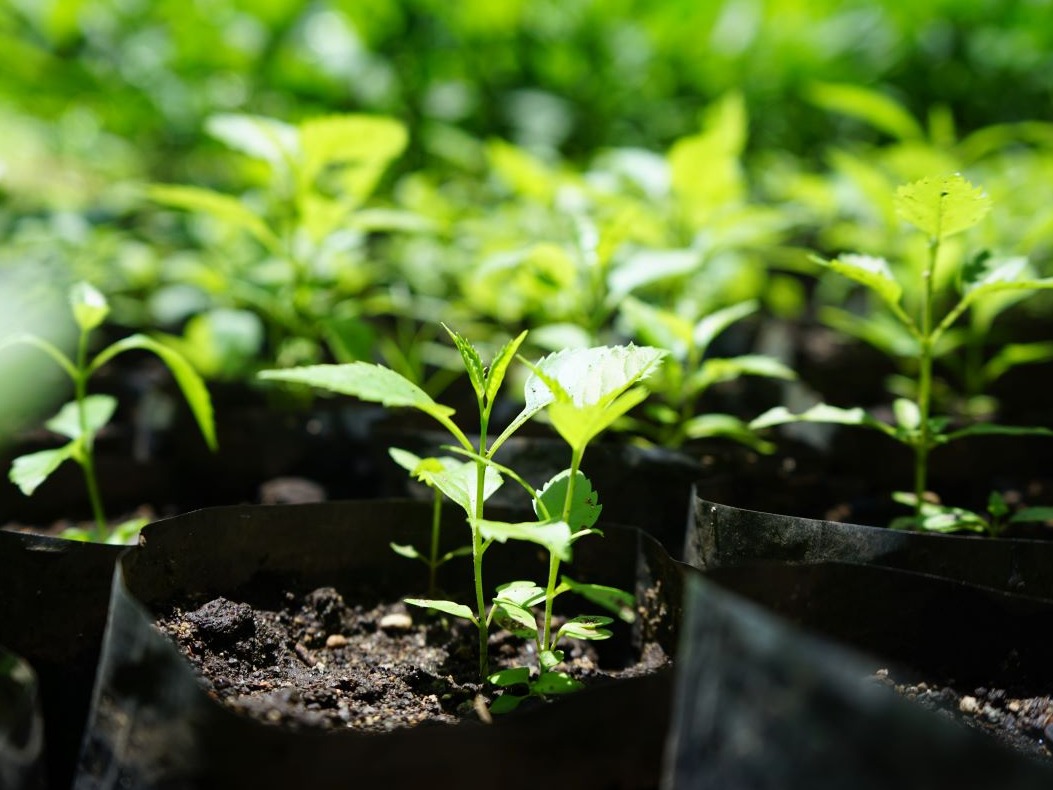Women tackle climate change with tree nurseries in El Salvador
Rosa Amparo Díaz leads a women's association that protects nature for future generations
-has-united-under-rosa-amparo-díaz-to-reverse-environmental-degradation-in-their-communities.jpeg?sfvrsn=eaafb8c3_7)
A group of women in Estanzuelas, Usulután (El Salvador), has united under Rosa Amparo Díaz to reverse environmental degradation in their communities.
©FAO/Javier Orellana
Rosa Amparo Díaz Cruz is a 42-year-old Salvadorean women working with her community to protect ecosystems and defend livelihoods. She lives in El Salvador’s El Escarbadero (Estanzuelas, Usulután) district, where she leads the Association of Women for the Development of Estanzuelas (AMUDES) – a group that unites five communities in the fight to reverse environmental degradation in the area.
Water scarcity, aggravated by reduced water flows in the Siguanaba River, poses a major threat to the livelihoods and food security of hundreds of family farmers who cultivate land along this stretch of Central America’s Dry Corridor, an area which is highly vulnerable to the impacts of climate change.
Like many women in her community, Rosa grows vegetables, but water scarcity is a growing problem in the climate-stressed region. To improve crop production, Rosa and women from the AMUDES group are using nature-based solutions to improve water management and regenerate the areas’ agroecosystems.
"In our work we have no limits, because to defend nature is to defend tomorrow and future generations to whom as women we also give life," says Rosa, explaining the women’s drive to establish a community forest nursery.
 The Reclima project supports the nursery by teaching good practices in seed and plant management. Photo credit: FAO/Javier Orellana.
The Reclima project supports the nursery by teaching good practices in seed and plant management. Photo credit: FAO/Javier Orellana.
Cooperative efforts such as growing and planting native fruit trees are supported by the “Increasing climate resilience measures in the agroecosystems of the dry corridor of El Salvador" project, known as “Reclima” – implemented by the Food and Agriculture Organization of the United Nations (FAO); the Environmental Investment Fund of El Salvador (FIAES); the Government of El Salvador, through the Ministry of Agriculture and Livestock (MAG), and the Ministry of Environment and Natural Resources (MARN); with the financial support of the Green Climate Fund (GCF).
As part of Reclima’s project activities, women receive soil, bags and seeds along with other inputs as well as training in good practices for seed and plant management. According to Rosa, the initiative offers women like her the opportunity to learn about soil and sand management as well as growing and planting tree species native to Central America, such as the Conacaste tree (Enterolobium cyclocarpum), known for its coiled, ear-shaped fruits and for the ample shade it provides, and the madre cacao tree (Gliricidia sepium) – a multipurpose, forage tree legume that provides fuelwood, nutrient-rich mulch, erosion control and land stabilisation, among other products.
"The work we do in the nursery is important because we know that through this initiative, we can help restore and protect the river basins and the environment, and safeguard our livelihoods," says Rosa.
What’s more, Rosa has found leading the nursery to be an important role for her, as a woman, saying "all the work is distributed equally among us.” She highlights that people from other districts have become involved in the nursery too, including some who were initially sceptical about women’s ability to run the nursery.
 The nursery led by Rosa is one of the 33 nurseries supported by the GCF-funded Reclima project in El Salvador. Photo credit: FAO/Javier Orellana.
The nursery led by Rosa is one of the 33 nurseries supported by the GCF-funded Reclima project in El Salvador. Photo credit: FAO/Javier Orellana.
Since the start of the Reclima project, thirty-three nurseries like the one led by Rosa Amparo have been strengthened or established in coordination with communities, Indigenous Peoples, Afro-descendants, municipalities and youth groups.
Community participation from project stakeholders like Rosa and the women in the AMUDES Association will ultimately lead to the restoration of around 17,000 hectares of degraded land over the Reclima project’s seven-year lifespan.
For more on the Reclima project, watch this video, see the FAO-GCF partnership website, and follow @FAOElSalvador.


